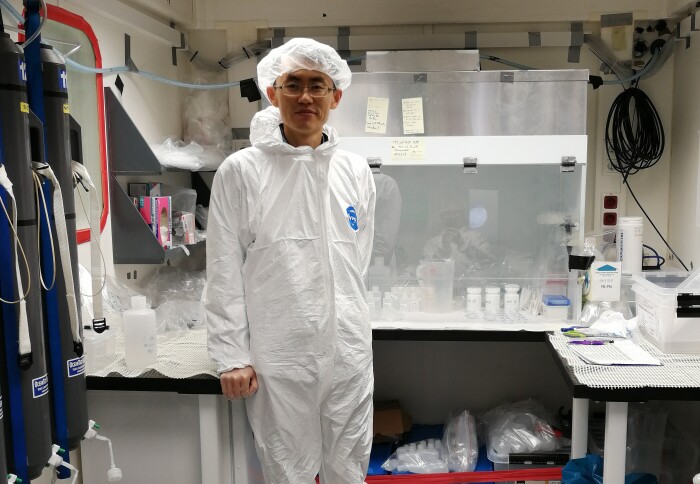Microbes, metals and climate mitigation: Q&A with Dr Fengjie Liu
by Phoebe Ross

Dr Fengjie Liu
Dr Fengjie Liu joins the Grantham Institute as a NERC Independent Research Fellow. We got to know him with some quick-fire questions.
Dr Liu first joined Imperial College London in 2018 as a Royal Society Newton International Fellow. In 2020 he moved to the GEOMAR Helmholtz Centre for Ocean Research, Germany, and after two years at the University of Liverpool, he re-joined us at Imperial as an Advanced Research Fellow at the Grantham Institute.
As an expert in chemical and biological oceanography, Dr Liu’s research focuses on interactions between the ocean and atmosphere, looking at carbon capturing microorganisms.
We caught up with him to learn more about the climate mitigating potential of microbes, his experiences to date, and his life away from research.
Your research has take you around the world - what have you enjoyed the most?
I’ve worked in Quebec City, Kiel, Hong Kong, London and I’ve been on research cruises. When it comes to work, I’ve enjoyed being at Imperial most, it’s very international and I have the opportunity to work with a wide range of people. For life, general life, I prefer Canada. The balance between work and family life is more even; it’s not so intense.
Tell us about life onboard a research vessel?
A few years ago, I went on a cruise in the Atlantic Ocean to research deep-sea hydrothermal vents. This was during COVID-19, so many cruises were cancelled but we were lucky enough for ours to go ahead. I really enjoyed it. There are some downsides of course, like sea sickness, and the work is quite intense; we work every day but Sunday. But the food on the cruise is great, and they provide lots of beer and wine so after we finished working we had a big party.

What is the aim of your research?
My work tries to understand the availability of metal iron in the ocean. Evidence suggests that iron availability in the ocean is tightly linked to the level of atmospheric CO2. We know the ocean is changing a lot with climate change, ocean chemistry is changing, acidity and temperature are changing, and this influences how much iron is available to microscopic organisms (microbes). Microbes known as phytoplankton are the central link between iron availability in the ocean and atmospheric CO2 levels. They need iron to grow. When they grow, they sequester (take up) carbon. Tens of thousands of years ago, when iron availability in the ocean was quite high, microorganisms grew at a faster rate, and this meant more CO2 uptake. There is large uncertainty surrounding the future iron availability in the ocean and what this means for atmospheric CO2 levels, so this is what I try to understand.
So, could we just add iron to the ocean?
This topic has been discussed for decades now. There are many in situ experiments trying to calculate how efficient adding iron to the ocean is in removing atmospheric CO2 and what potential drawbacks there might be. From the current evidence, it seems the potential for CO2 removal is small. It will certainly change local ecology and there are still questions as to how much this whole process would be able to mitigate human caused climate change.

If you could go anywhere in the world, on a research cruise or a holiday, where would that be?
For research I want to go to the polar regions. My work is rooted in climate change, so I would like to see how the biodiversity and landscape is changing. We know that it’s changing a lot and will continue to change in the future, so I would love to go and see it for myself as it is now. For a holiday I would like to go to China. I haven’t had any chance to visit my parents and grandma since COVID-19.
What do you enjoy doing to take yourself away from research?
On weekends we like to go to the park as a family. I have children and we all enjoy that time together. Kew Gardens and Richmond Park are some of our favourites.
What would be your desert island meal?
The food prepared by my mum. Chinese dumplings, it’s been a long time since I had them.
Where do you see your research going in the future?
There are two main topics, one is future availability of ocean iron and the other is deep-sea mining. We are transitioning from a carbon-based society to one based on renewable energy, which is great, but renewables require critical metals that many countries are trying to mine from the deep-sea. There needs to be more research into the environmental implications of using these metals. Copper pollution, for example, could become an environmental issue. It is increasingly used to make many parts for solar panels and electric cars. Deep-sea mining is also a big concern for the scientific community, the methods are so intensive it can negatively impact ecosystem health.

What are you enjoying about working at the Grantham Institute?
It’s a great place to bring people together from different disciplines and different sectors. There are lots of opportunities to interact with policy makers, great outreach and public engagement opportunities, and the team at Grantham help me to translate my science into wider impact. I believe my science can already produce a greater impact after having worked here for three months.
Article supporters
Article text (excluding photos or graphics) © Imperial College London.
Photos and graphics subject to third party copyright used with permission or © Imperial College London.
Reporter
Phoebe Ross
The Grantham Institute for Climate Change